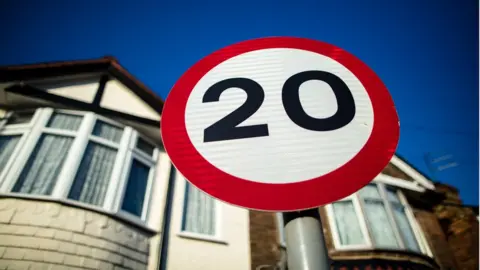Buckinghamshire Council confirms no 20mph zone funding
 Getty Images
Getty ImagesA council has come under fire for refusing to pay to install any future 20mph (32.1kmph) speed limit zones.
A motion before Buckinghamshire Council on Wednesday highlighted the cost of replacing signs and said future schemes should be paid for by the applicants.
It also said there should be no expectation that the authority and the police would enforce them.
The 20's Plenty campaign has called the authority a "regressive stick-in-the-mud council".
Campaign founder, Rod King, said: "20mph limits are hugely successful in the way they are being adopted around the country.
"Buckinghamshire sticks out as a regressive, stick-in-the-mud council which really doesn't want to do anything to make our residential streets more pleasant places.
"Responsibility for setting and funding speed limits which vary from the national limit is with the local traffic authority and that is Buckinghamshire Council, they have the resources, they have the skills, what they don't have is the will."
The motion, put forward by councillor Steve Broadbent, the cabinet member for transport, and backed by leader Martin Tett, clarified that the council already no longer funds new 20mph zones.
It points to neighbouring Oxfordshire County Council, which estimates that replacing its 30mph limit signs with 20mph signs will cost about £8m.
You may also like:
The council said 20mph zones and speed limits "should be largely self-enforcing" due to the road layout and design or because of traffic calming being present.
It said research by the Department for Transport showed the zones only resulted in a small reduction in average speeds and that there was "insufficient evidence" that reduced speeds resulted in fewer collisions or casualties.
"20mph zones/limits are already subject to the requirement for external funding, outside of Buckinghamshire Council highways funds," a statement said.
"The motion merely reiterates that the applicants will incur relevant costs. These applicants are usually parish councils or community groups."
Ch Insp Chris Spellerberg, from Thames Valley Police, said it had "limited resources available to enforce speed limits".
"We target those resources with a consistent approach towards areas of high risk and harm and the seriousness of any breach," he said.
He added that in areas chosen for 20mph, the most effective long term way to tackle speeding was "an integrated approach including changes to driver behaviour and the road environment, such as traffic calming measures".

Find BBC News: East of England on Facebook, Instagram and Twitter. If you have a story suggestion email [email protected]
